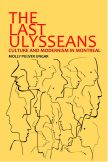The Last Ulysseans: Culture and Modernism in Montreal
 In the 1930s, the exciting urban environment of Montreal provided the perfect venue for a varied group of people who came together to form a kind of “salon” in the turmoil of the Great Depression. For ten years, these friends and acquaintances met each week at the home of the artist John Lyman. They saw themselves as “modern,” a part of the avant-garde that was then busily changing the world. These Canadian modernists supported left-wing causes, advocated a more stable social order, and heralded a more inclusive culture. More than anything, they searched for a way in which their lives would have meaning.
In the 1930s, the exciting urban environment of Montreal provided the perfect venue for a varied group of people who came together to form a kind of “salon” in the turmoil of the Great Depression. For ten years, these friends and acquaintances met each week at the home of the artist John Lyman. They saw themselves as “modern,” a part of the avant-garde that was then busily changing the world. These Canadian modernists supported left-wing causes, advocated a more stable social order, and heralded a more inclusive culture. More than anything, they searched for a way in which their lives would have meaning.
In The Last Ulysseans, Molly Pulver Ungar describes this dynamic group’s private and public activities of the group from the beginning of the Great Depression through the outbreak of the Spanish Civil War to the final years of the 1930s. In face of the ominous certainty of another war in Europe, these individuals reached a new understanding of what it meant to live a modern, meaningful life. Their conscious pursuit of new directions in outlook, attitude, and lifestyle influenced many of the changes in post-war North American society.
ACADEMICA PRESS
1727 Massachusetts Avenue, NW, Suite 507
Washington, DC 20036
academicapress.editorial@gmail.com
